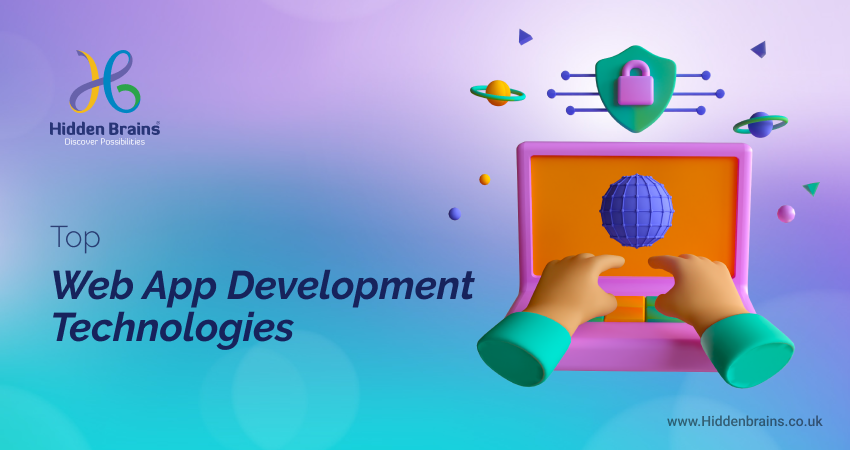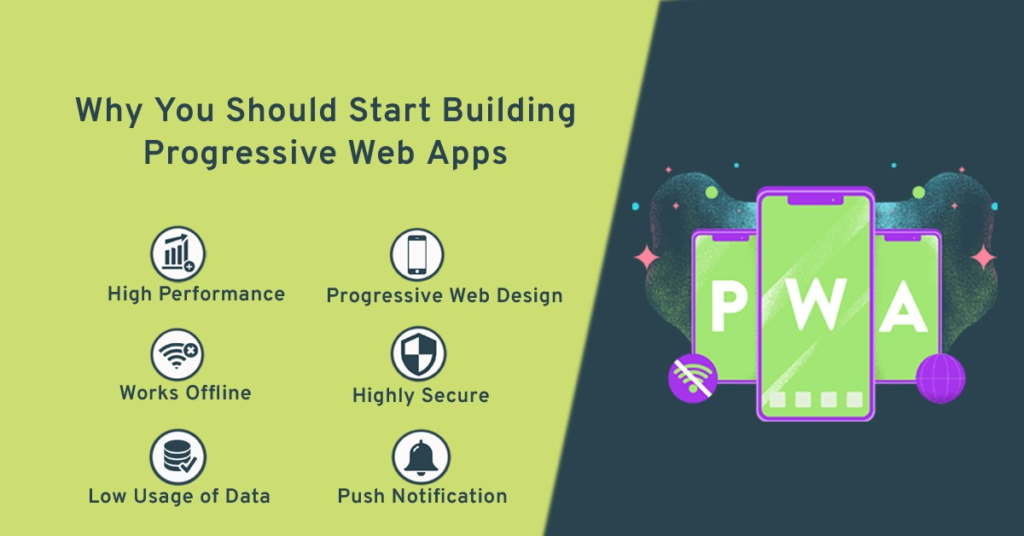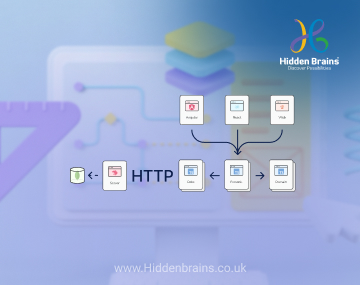
Are these top web app development technologies help you keep your business alive in the competitive market for the next few decades?
According to the Statista report, there are around 5.6 billion internet users which is rapidly increasing every next five minutes.
On one side, the increasing number of internet users are giving hope to business to capture a larger segment of the market but on another side making it challenging to meet their frequently changing psychology of accessing web apps.
With the changing demand of users, the web app development world is also changing and so do the trends. In fact, at times web app development trends and technologies are changing faster than they can be used.

Image Source: statista.com
If you want to pace up with the changing technologies, then you need to slay with the latest web app development technologies that make your business future ready.
But the question is how will you do that?
Instead of conducting market research and draining your time and efforts in evaluating what technologies will suit your business needs and how they will make your business ready for the future?
Well to save you time and effort, here we have combined a few most burning web app development technologies that can help in business expansion and enables you to stand strong in the competitive market.
Key Extract Of Our Blog
- In 2024, businesses are inclining toward offering multi-experience integration to attract, engage and retain users. So just focusing on building a mobile/web app is no longer remain a competitive thing. To go beyond that and to add a competitive edge, you need to make your app available on various devices to target larger user segments.
- Data security is the key concern of businesses, so adopting security-oriented web app development technologies such as Blockchain and IoT can be your sensible decision to protect sensitive data and ensure transparent transactions.
- Speed is all the user needs while accessing your app. So integrating web app development technologies like Voice Search commands, and AR and VR technologies in your web app can be a worthy decision. It will also enhance their decision-making and encourage them to make instant buying decisions.
Whether you are a startup or a leading business, surely one of these concerns is related to your issue as well. So let’s get started…
Major Web App Development Technologies That Are Roaring in 2024
You may have already heard about these website development technologies and trends on the internet, but over recent years, these trends have become a buzzword in the software development industry.
So let’s take a sneak peek at these website development technologies to learn how they can help you expand your business.
1. Progressive Web App

Image Source: media.licdn.com
Progressive Web Apps (PWAs) are among while listing the top web app development trends in 2024. It aims to combine the best features of web and mobile applications, therefore fastly gaining popularity among businesses. In fact, progressive web apps are fastly replacing traditional websites in 2024.
Wondering Why?
According to the survey report Forbes – PWA adoption by major companies like Flipkart, and Alibaba has seen a 70 to 76% gain in their conversions after launching their PWA and a 14% increase in their monthly users.
A PWA is built using modern web technologies like HTML, CSS, and JavaScript and is designed to deliver a fast, reliable, and engaging user experience. One of the key advantages of PWAs is their ability to work seamlessly across different devices and platforms, including desktops, smartphones, and tablets.
Key Offerings of Progressive Web Apps (PWAs) to the Users
Here are some of the reasons why PWAs are becoming popular with businesses…
- Offline Capabilities: PWAs can work offline or in low-connectivity environments by caching app resources and data, ensuring uninterrupted access for users.
- Fast Loading Times: PWAs leverage techniques like lazy loading and caching to provide quick loading times, reducing bounce rates and improving user satisfaction.
- Push Notifications: PWAs can send push notifications to users, enabling re-engagement and driving user retention.
- Responsive Design: PWAs are designed to be responsive and fit any screen size, providing a consistent and optimized experience across devices.
- App-Like Experience: PWAs offer an immersive app-like experience, with features like fullscreen mode, home screen installation, and smooth anim
Though there are a number of tools and frameworks available to build PWAs, it is always worth hiring a web app development company in the UK that understands the market needs and is able to build a solution that adds edge to your business.
2. Empowering Business App With Artificial Intelligence(AI) Algorithms
Artificial Intelligence (AI) is not a new hue for businesses, but with the way AI is transforming business modules and empowering organizations with real-time analytics, it’s time to pay serious attention to this cutting-edge web app development trend.
Though many of you have already known the fact that integrating AI technology in a web app can provide you with better insights into user behavior and future sales, how does it work?
How does it make your web app work that smartly?
Well, it involves integrating intelligent algorithms and machine learning capabilities into applications that not only help automate tasks but also personalize user experiences and gain valuable insights from data.
AI-powered chatbots, recommendation systems, and image recognition are just a few examples of how AI is transforming web app development.

Image Source: statista.com
Still, if you are doubtful that how AI can impact your business then you should check out these key highlights of AI.
The Impact of AI on Web App Development
- Automation: AI enables the automation of repetitive tasks, such as data entry, customer support, and content moderation. This not only saves time and resources but also improves operational efficiency. According to Gartner, AI-powered automation can reduce up to 70% of manual tasks by 2024.
- Personalization: AI algorithms can analyze user behavior, preferences, and past interactions to deliver personalized experiences. This enhances customer engagement, increases conversions, and fosters loyalty. A study by Evergage found that 88% of marketers reported measurable improvements due to personalization efforts driven by AI.
- Predictive Analytics: AI-powered predictive analytics can analyze large datasets to forecast trends, patterns, and user behavior. This helps businesses make informed decisions, optimize marketing strategies, and identify growth opportunities. According to a survey by McKinsey, companies that use AI for predictive analytics outperform their competitors by 5% in terms of productivity and 6% in profitability.
- Natural Language Processing (NLP): NLP enables web apps to understand and process human language. AI-powered chatbots and voice assistants leverage NLP to provide conversational interfaces, answering user queries and offering assistance. According to Grand View Research, the NLP market is expected to reach $43.2 billion by 2025.
- Fraud Detection and Cybersecurity: AI algorithms can detect patterns and anomalies in real time, helping to identify potential fraud and enhance cybersecurity measures. A report by Capgemini states that 69% of organizations have experienced an improvement in their cybersecurity posture due to AI adoption.
- Data Insights and Decision-making: AI-powered analytics can analyze large volumes of data quickly, extracting valuable insights and supporting data-driven decision-making. According to IBM, companies that use AI-powered analytics achieve an average ROI of 135%.
These are the few capabilities that Artificial intelligence can add to your business. However, the impact of this technology is majorly dependent upon the skills of the developer that how proficiently it integrates it. So better to hire app developers in the UK with the right experience.
If you are in the healthcare industry, then learn more about how AI chatbots are empowering healthcare services.
3. Integrating Blockchain Technology in Web App
In recent years, Blockchain integration is considered one of the major web app development technologies and trends it offers transparency, security, and immutability. By integrating blockchain into web apps, businesses can enhance data integrity, streamline transactions, and increase trust among users.
Industry’s tech giants have already adopted blockchain into their web app solutions as it ensures improved security through cryptographic techniques, elimination of intermediaries, and increased efficiency by reducing redundant processes.
According to a report by PwC, 84% of executives believe that blockchain technology is scalable and will achieve mainstream adoption.
Additionally, a study by MarketsandMarkets estimates that the blockchain market will reach $39.7 billion by 2025, indicating the growing importance of blockchain in various industries.
So here the central question arises what industries can leverage Blockchain technology?
Blockchain technology has the potential to bring benefits to various industries. Here are some industries where blockchain is proving to be useful:
- Finance and Banking: Blockchain can streamline and secure financial transactions, facilitate cross-border payments, reduce fraud, and provide transparency in financial operations.
- Supply Chain and Logistics: Blockchain can improve traceability, enhance supply chain transparency, and automate processes such as inventory management, product authentication, and provenance tracking.
- Healthcare: Blockchain can securely store and share patient data, enable interoperability between healthcare providers, streamline insurance claims processing, and enhance drug traceability to combat counterfeit medicines.
- Retail and E-commerce: Blockchain can enable transparent and secure transactions, streamline supply chain processes, prevent counterfeit products, and enhance customer loyalty programs.
- Real Estate: Blockchain can simplify property transactions, automate property title transfers, enhance transparency in property records, and enable fractional ownership and crowdfunding in real estate investments.
- Energy and Utilities: Blockchain can facilitate peer-to-peer energy trading, enable smart grid management, track renewable energy certificates, and improve transparency in energy transactions.
- Government and Public Sector: Blockchain can enhance the security and transparency of public records, enable secure voting systems, streamline identity management, and improve efficiency in public service delivery.
- Insurance: Blockchain can automate insurance claims processing, enable secure and transparent underwriting, improve fraud detection, and enhance customer trust through smart contracts.
- Intellectual Property: Blockchain can provide secure and immutable records of intellectual property rights, enable transparent licensing and royalty management, and prevent plagiarism and counterfeiting.
- Education: Blockchain can verify and secure educational credentials, facilitate transparent and verifiable certification processes, and enable lifelong learning records.
No matter how complex and simple app development requirements you have, hiring a software development company in the UK can help develop an app that brings success to your business.
4. Virtual Reality To Deliver 3D Experience
Why Virtual Reality (VR) technology has gained a central stage in the field of web app development?
Why businesses are going crazy towards this technology?
Well, VR is a cutting-edge web app development technology and trend that offers users immersive experiences by creating a simulated environment. With VR integration in web apps, businesses can revolutionize various industries such as gaming, real estate, education, and training. As VR enables users to interact with digital content in a three-dimensional space, providing a sense of presence and engagement.
By integrating VR into web apps, businesses can enhance product visualization, create virtual tours, offer interactive training simulations, and deliver unique user experiences.
According to Fortune Business Insights, the VR market is projected to reach $57.55 billion by 2027, with increasing adoption across multiple sectors.

Image Source: mma.prnewswire.com
VR is rapidly becoming a crucial technology for businesses seeking to differentiate themselves and provide captivating experiences to their users.
What Type of Web Applications You Can Develop Using Virtual Reality(VR)?
Using Virtual Reality (VR) technology, various types of web apps can be developed to provide immersive and interactive experiences. Here are some examples:
- Virtual Tours: VR can be used to create virtual tours of real estate properties, hotels, tourist attractions, museums, and more. Users can explore these spaces from the comfort of their homes, experiencing a realistic and immersive environment.
- Gaming Apps: VR opens up exciting possibilities for gaming on the web. Web-based VR games can offer players a fully immersive and interactive gaming experience, allowing them to engage with virtual worlds and characters in a more realistic and engaging way.
- Training Simulations: VR can be utilized to develop web apps that provide training simulations for various industries. For example, it can be used in aviation for pilot training, in healthcare for medical simulations, or in manufacturing for equipment operation training.
- Virtual Showrooms: Businesses can create virtual showrooms to showcase their products in a visually appealing and interactive way. Users can browse through virtual shelves and displays, examine products from different angles, and even make virtual purchases.
- Education: VR can enhance online education by creating virtual classrooms or immersive learning environments. Students can engage in virtual field trips, participate in interactive simulations, or practice hands-on skills in a virtual setting.
- Design and Architecture: Architects and designers can leverage VR technology to create web apps that allow clients to experience and interact with virtual representations of their designs. This enables clients to visualize spaces, make design choices, and provide feedback before construction.
- Virtual Events and Conferences: Web-based VR apps can be developed to host virtual events, conferences, or trade shows. Attendees can navigate virtual exhibition halls, attend virtual sessions, and network with other participants in a simulated environment.
By harnessing the capabilities of VR technology, these web apps provide users with immersive, engaging, and interactive experiences, revolutionizing various industries and opening up new possibilities for businesses to connect with their audience in a more captivating way.
As far as the cost to create a web app is concerned, then you can expect to spend somewhere between $15,000 to $20,000 for the basic apps.
AR/VR Is a New Hue Trend In Web App Development
Augmented Reality and Virtual Reality, are one of the rapidly emerging web app development technologies that have shaken the various industries.
AR enhances the real world by overlaying digital content, while VR immerses users in a simulated environment. By integrating AR/VR into web apps, businesses can offer engaging and interactive experiences to their users.
AR/VR can be applied in various industries, including gaming, e-commerce, real estate, education, and healthcare. If your question is how AR/VR will helps you in business expansion, then you need to know that the global VR market is expected to reach $57.55 billion by 2027.
If you also want to be a part of this thriving industry, then you can pick one of the below AR/VR based app ideas in 2024.
- Revolutionize Interior Design with AR/VR Room Visualization
- Take Virtual Tours to the Next Level with AR/VR Travel Experiences
- Transform Shopping: Augmented Reality for Try-Ons and Product Visualization
- Enhance Training and Simulation: VR Solutions for Industries
- Step into the Future: Virtual Reality Gaming for Unforgettable Adventures
- Boost Real Estate Sales with AR/VR Property Showcasing
- Augmented Reality for Enhanced Customer Engagement and Branding
- Revamp Healthcare: AR/VR Solutions for Medical Training and Patient Care
- Virtual Reality Events: Engage Audiences Anywhere, Anytime
- AR/VR Fitness Apps: Experience Interactive Workouts Like Never Before
By hiring an AR/VR development company in the UK, you can easily kickstart your project and even get a solution that better fits your business requirements.
In a nutshell, these are the few web app development technologies that can take your business to a new height in 2024. But what technologies you can use for developing a web app.
What Are The Popular Choices of Web App Tech Stacks To Consider in 2024?
In 2024, there are several popular choices of web app tech stacks that developers often consider. These tech stacks consist of combinations of programming languages, frameworks, libraries, and tools that work together to build web applications. Here are some popular web app tech stacks and their uses:
1. MEAN Stack (MongoDB, Express.js, Angular, Node.js)
MEAN stack is suitable for building dynamic and feature-rich web applications. It provides a comprehensive development ecosystem, supports two-way data binding, and facilitates the development of single-page applications.
- MongoDB: A NoSQL database for flexible and scalable data storage.
- Express.js: A web application framework for Node.js that simplifies server-side development.
- Angular: A TypeScript-based framework developed by Google for building robust and scalable web applications.
- Node.js: A runtime environment that allows running JavaScript on the server side, enabling highly scalable and performant web applications.
No matter whether developing a complex web application or a simple progressive app, MEAN stack can be your ultimate choice.
2. LAMP Stack (Linux, Apache, MySQL, PHP)
LAMP stack is a widely used and established technology stack for building web applications. It is especially popular for developing content-driven websites and applications with a strong reliance on a relational database.
- Linux: An open-source operating system that serves as the foundation for the stack.
- Apache: A popular web server software that handles HTTP requests.
- MySQL: A relational database management system for storing structured data.
- PHP: A server-side scripting language used for web development.
A skilled web app developer can easily use this technology combination and implement it rightly into a web app development concept.
3. Django Stack (Python, Django, PostgreSQL):
Django stack is ideal for building robust and scalable web applications with a focus on code simplicity and maintainability. Django provides extensive built-in features, follows the Model-View-Controller (MVC) architectural pattern, and emphasizes security and rapid development.
To make it work, Django works with the below combination of tech-stack:
- Python: A versatile and beginner-friendly programming language.
- Django: A high-level Python web framework that simplifies web application development.
- PostgreSQL: A powerful open-source relational database management system.
Though this combination is not unique, but you need to look for app development services in the UK that help you leverage these technologies as a package.
4. React Native: Write Once, Use Anywhere
A JavaScript framework developed by Facebook, which allows you to build native mobile apps for both iOS and Android platforms using a single codebase. It leverages the power of React to create performant and visually rich mobile applications.
5. Flutter: A Power UI SDK Tool Kit
A UI toolkit developed by Google, which enables you to build beautiful and fast cross-platform apps using a single codebase. Flutter uses the Dart programming language and provides a rich set of pre-designed widgets for building visually appealing user interfaces.
6. Xamarin- A Trust Product of Microsoft
A Microsoft-owned framework that allows you to build native mobile apps using C#. Xamarin enables code sharing across multiple platforms, including iOS, Android, and Windows, resulting in faster development cycles and reduced effort.
These are the few popular web app development tech stacks in 2024. The choice of a tech stack depends on factors such as project requirements, development expertise, scalability needs, and performance considerations. So before you make a choice, it’s essential to assess the specific needs of your project and select the stack that best aligns with your goals and development capabilities.
Conclusion:
How Do Hidden Brains UK Can Help You Pick the Right Web App Development Technology in 2024?
Hopefully, with this blog guide, you have got an idea about the latest web app development trends and technologies that are taking the world by storm. But still, if you are in doubt that what technologies and trends are the best fit for your app idea, then you can hire a web app development company in the UK with the right expertise and experience in the field, understanding of the latest trends, advancements, and industry-specific requirements.
Their team of skilled professionals can guide you through the decision-making process, ensuring that you choose the most suitable technology to meet your unique business needs and future goals. So for any details you can contact us and discuss the project details further.
FAQs
How can Progressive Web Apps (PWAs) help expand your business?
PWAs provide a native app-like experience within a web browser, enabling businesses to reach a wider audience across different devices. They offer offline capabilities, push notifications, and seamless updates, enhancing user engagement and expanding business opportunities.
What are the advantages of AI and ML integration in web app development?
Integrating AI and ML technologies into web apps allows for personalized user experiences, intelligent data analysis, automation of tasks, and predictive analytics. These capabilities can help businesses gain insights, improve decision-making, and enhance customer satisfaction.
How can low-code or no-code development platforms benefit your business?
Low-code or no-code platforms simplify the web app development process, enabling businesses to build applications with minimal coding knowledge or experience. They speed up development cycles, reduce costs, and empower business users to create their own custom solutions.
How can choosing the right web app development technologies in 2024 benefit your business?
Choosing the right web app development technologies in 2024 can help businesses stay competitive, enhance user experiences, improve efficiency, and streamline operations. It allows for faster development, scalability, better performance, and access to the latest features and functionalities.
Do Not Forget To Visit Our Robust and Secure Services:
Mobile App Development Company in The UK | iOS App Development Company In the UK | Android App Development Company in the UK | Web Application Development Agency in the UK | PHP Development Company in the UK | ASP.NET Development Company in the UK | Hire Developers in the UK | Hire Best iPhone App Developers in the UK | Hire Android App Developers | Hire Web Developer in the UK | Hire PHP Developers In The UK | Hire ASP.NET Developers in the UK
Table of Contents





